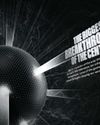
In the first half of 2024, satellites belonging to SpaceX's Starlink fleet. performed almost 50,000 collision-avoidance manoeuvres. This reflects the number of satellites orbiting Earth and raises fears about satellite collisions if we continue to launch more in an unchecked fashion. Considering how much of our telecommunications and navigation now comes from space, not to mention the observation data that informs us about climate change, fears of a catastrophic crash -triggering a loss of such essential services are understandable.
But according to Andy Lawrence, Regius Professor of Astronomy at University of Edinburgh, it's more insidious than that. "This idea that eventually there will be some sort of catastrophe is not quite right. It's more like the infamous 'boiling the frog' problem," he says.
Essentially, the idea is that if a frog were dropped into boiling water, it would instantly leap out.
But if it were placed into cold water to which heat was gradually applied, it wouldn't perceive the danger and be boiled alive. "It's exactly like climate change. You know it's getting gradually worse, but where do you say 'stop', and how do you manage to make it stop?" says Lawrence.
To circle the Earth, a satellite has to move at a minimum of 7.8km/s (4.8 miles/s). At this velocity, collisions would release an enormous amount of energy, shattering the spacecraft involved and producing large clouds of debris that could destroy other satellites.
Such crashes have already been happening: in 2009, the functioning US satellite Iridium 33 and the inoperable Russian Cosmos 2251 collided at 11.7km/s (7.3 miles/s), producing more than 2,000 pieces of trackable debris and many smaller pieces.
Bu hikaye BBC Science Focus dergisinin October 2024 sayısından alınmıştır.
Start your 7-day Magzter GOLD free trial to access thousands of curated premium stories, and 9,000+ magazines and newspapers.
Already a subscriber ? Giriş Yap
Bu hikaye BBC Science Focus dergisinin October 2024 sayısından alınmıştır.
Start your 7-day Magzter GOLD free trial to access thousands of curated premium stories, and 9,000+ magazines and newspapers.
Already a subscriber? Giriş Yap

THE WORST IDEAS OF THE 21ST CENTURY
NOT ALL IDEAS CAN BE HITS. ALONGSIDE GROUND-BREAKING INNOVATIONS, 21ST-CENTURY SCIENTISTS HAVE HELMED THEIR SHARE OF WILD TECH FLOPS, DUBIOUS THEORIES AND OVERHYPED BREAKTHROUGHS. HERE ARE THE BIGGEST TO FORGET

10 IDEAS THAT WILL SHAPE YOUR NEXT 25 YEARS
Predicting the future is considered a fool's game. But it's one many of us like to play.

THE BIGGEST BREAKTHROUGHS OF THE CENTURY
We're a quarter of the way into the new century. To mark this milestone, we asked the UK's top minds to highlight some of the game-changing scientific breakthroughs shaping our world since the year 2000

DO THE SCIENCE COGNITIVE SHUFFLE
Trouble sleeping? A lot on your mind? Use this trick and sedate your synapses

WHAT DETERMINES HOW MANY ABS I CAN GET?
Assuming you're a human being, you have exactly the same number of abs as everybody else: two.

HOW CAN I IDENTIFY MY PSYCHOLOGICAL BLIND SPOT?
In the 1950s two American psychologists, Joseph Luft and Harrington Ingham, proposed a way of thinking about psychological blind spots - things you don't know about yourself - that they called the 'Johari Window' (the term is a combination of their first names).

How can I change my personality?
Want to become more confident, extroverted or assertive? Science shows that with a few simple changes, you can unlock your best self

Could your cosmetics be harming your health?
Cosmetic companies are phasing out microplastics and so-called 'forever chemicals' to help protect consumers.

extraterrestrial US Congress is talking about activity again. Is the truth really out there?
Despite several testimonies, the question remains frustratingly unanswered

Map of 100 million human body cells revealed
Over three dozen new studies mark significant milestone towards complete Human Cell Atlas